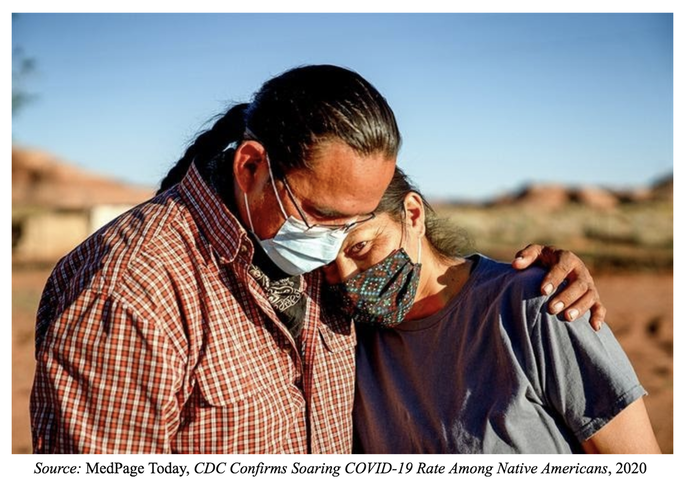|
Since the outbreak of COVID-19, there have been over six million confirmed cases in the United States, disrupting American work, families, and lives. However, one group is particularly vulnerable: Native Americans, specifically those living on reservations, are 5.3 times more likely to be hospitalized due to COVID-19 than white people. To understand these disparities, it is important to look at the history of the United States’ relationship with Native Americans. Despite treaties preventing them from doing so, the federal government stole Native American land and relocated thousands of individuals throughout the nineteenth and twentieth century. Today, reservations are owned by the federal government, meaning that Native Americans cannot utilize the resources on their land without the permission of the government. This is just one factor that contributes to the poverty on reservations: Native Americans are unable to make money off of the land that they own. Native Americans living on reservations are less likely to have access to running water, have a larger household size, and are more likely to rely on public transport, all of which contribute to a higher infection rate. Despite information that Native Americans are disproportionately affected by COVID-19, there is a severe lack of data concerning the racial and ethnic breakdown of cases. Race and ethnicity data only began to be collected by the federal government on August 1, 2020. Native Americans are also often excluded from testing groups: the CDC initially denied tribal epidemiology centers, and data collected by local tribes, state governments, and national agencies are often wildly inconsistent. To make the correct policy decision, more comprehensive information is needed. The fact that this issue could possibly be much, much larger than we think only exacerbates the need for action. The lack of data further marginalizes an already discriminated group, pushing them to the statistical sidelines when analyzing the virus. While some groups say that federally recognized tribes are supposed to be treated as quasi-independent entities, it is still the responsibility of the federal government to provide aid and stimulus to Native American communities. The Indian Health Service System (HIS), the branch that’s responsible for providing healthcare for Native Americans, is critically underfunded and on average understaffed by 25%. The federal government also infamously excluded tribal communities from the 2009 Recovery Act, which failed to provide aid to already-impoverished tribal communities after the recession. This year, $8 billion was allocated for tribal communities in the CARES Act for COVID-19 relief; however, it is the federal government’s responsibility to provide more economic funding. The money was spread across 574 tribal governments, each suffering from a lack of healthcare professionals, a lack of resources, and sick citizens who can’t work, and thus, can’t help tribal economies. The federal government must evaluate aid on a tribe-by-tribe basis, working with tribal leaders to determine how much funding is needed, and then, provide that aid without question.
The views expressed above are solely the author's and are not endorsed by the Virginia Policy Review, The Frank Batten School of Leadership and Public Policy, or the University of Virginia. Although this organization has members who are University of Virginia students and may have University employees associated or engaged in its activities and affairs, the organization is not a part of or an agency of the University. It is a separate and independent organization which is responsible for and manages its own activities and affairs. The University does not direct, supervise or control the organization and is not responsible for the organization’s contracts, acts, or omissions.
0 Comments
Your comment will be posted after it is approved.
Leave a Reply. |
Categories
All
Archives
April 2022
|
ADDRESSVirginia Policy Review
235 McCormick Rd. Charlottesville, VA 22904 |
|
|

